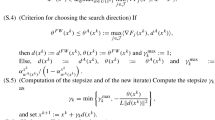Abstract
In this paper, we present a variant of the primal affine scaling method, which we call the primal power affine scaling method. This method is defined by choosing a realr>0.5, and is similar to the power barrier variant of the primal-dual homotopy methods considered by den Hertog, Roos and Terlaky and Sheu and Fang. Here, we analyze the methods forr>1. The analysis for 0.50<r<1 is similar, and can be readily carried out with minor modifications. Under the non-degeneracy assumption, we show that the method converges for any choice of the step size α. To analyze the convergence without the non-degeneracy assumption, we define a power center of a polytope. We use the connection of the computation of the power center by Newton's method and the steps of the method to generalize the 2/3rd result of Tsuchiya and Muramatsu. We show that with a constant step size α such that α/(1-α)2r > 2/(2r-1) and with a variable asymptotic step size αk uniformly bounded away from 2/(2r+1), the primal sequence converges to the relative interior of the optimal primal face, and the dual sequence converges to the power center of the optimal dual face. We also present an accelerated version of the method. We show that the two-step superlieear convergence rate of the method is 1+r/(r+1), while the three-step convergence rate is 1+ 3r/(r+2). Using the measure of Ostrowski, we note thet the three-step method forr=4 is more efficient than the two-step quadratically convergent method, which is the limit of the two-step method asr approaches infinity.
Similar content being viewed by others
References
I. Adler, N.K. Karmarkar, M.G.C. Resende and G. Veiga, An implementation of Karmarkar's algorithm for linear programming, Mathematical Programming 44(1989)297–335.
I. Adler and R.D.C. Monteiro, Limiting behavior of the affine scaling continuous trajectories for linear programming problems, Mathematical Programming 50(1991)29–51.
E.R. Barnes, A variation on Karmarkar's algorithm for solving linear programming problems, Mathematical Programming 36(1986)174–182.
R.P. Brent, Some efficient algorithms for solving systems of non-linear equations, SIAM Journal on Numerical Analysis 10(1973)327–344.
D. den Hertog, C. Roos and T. Terlaky, Inverse barrier methods for linear programming, Recherche Opérationelle 28(1994)135–163.
I.I. Dikin, Iterative solution of problems of linear and quadratic programming, Soviet Mathematics Doklady 8(1967)674–675.
I.I. Dikin, On the convergence of an iterative process, Upravlyaemye Sistemi 12(1974)54–60 (in Russian).
I.I. Dikin, The convergence of dual variables, Technical Report, Siberian Energy Institute, Irkutsk, Russia (1991).
I.I. Dikin, Determination of interior point of one system of linear inequalities, Kiebernetica and System Analysis 1(1992)74–96.
C.C. Gonzaga, private communication (1993).
L.A. Hall and R.J. Vanderbei, Two-thirds is sharp for affine scaling, O.R. Letters 13(1993) 197–201.
N.K. Karmarkar, A new polynomial-time algorithm for linear programming, Combinatorica 4 (1984)373–395.
W.F. Mascarenhas, The affine scaling algorithm fails for λ=0.999, Technical Report, Universidade Estadual de Campinas, Campinas S.P., Brazil (1993).
R.D.C. Monteiro, T. Adler and M.G.C. Resende, A polynomial time primal-dual affine scaling algorithm for linear and convex quadratic programming, Mathematics of Operations Research 15 (1990)191–214.
R.D.C. Monteiro, T. Tsuchiya and Y. Wang, A simplified global convergence proof of the affine scaling algorithm, Annals of Operations Research 47(1993)443–482.
A.M. Ostrowski,Solution of Equations and Systems of Equations (Academic Press, New York, 1960).
R. Saigal, A simple proof of the primal affine scaling method, Technical Report No 92-60, Department of Industrial and Operations Engineering, University of Michigan, Ann Arbor, MI 48109 (1992), Annals of Operations Research, this volume.
R. Saigal, A three step quadratically convergent implementation of the primal affine scaling method, Technical Report No. 93-9, Department of Industrial and Operations Engineering, University of Michigan, Ann Arbor, MI 48109 (1993).
R. Saigal and M.J. Todd, Efficient acceleration techniques for fixed point algorithms, SIAM Journal on Numerical Analysis 2(1978)997–1007.
R.L. Sheu and S.C. Fang, On the generalized path-following methods for linear programming, Technical Report. O.R. Technical Report No. 261, North Carolina State University, Raleigh, NC 27695 (1992), to appear in Optimization.
P. Tseng and Z.Q. Luo, On the convergence of the affine-scaling algorithm, Mathematical Programming 56(1992)301–319.
T. Tsuchiya, Global convergence of the affine-scaling methods for degenerate linear programming problems, Mathematical Programming 52(1991)377–404.
T. Tsuchiya, Global convergence property of the affine scaling method for primal degenerate linear programming problems, Mathematics of Operations Research 17(1992)527–557.
T. Tsuchiya and R.D.C. Monteiro, Superlinear convergence of the Affine Scaling Algorithm, Research Memorandum, The Institute of Statistical Mathematics, 4-6-7 Minami-Azabu, Tokyo, Japan (1992).
T. Tsuchiya and M. Muramatsu, Global convergence of a long-step affine scaling algorithm for degenerate linear programming problems, Research Memoranum 423, The Institute of Statistical Mathematics, 4-6-7 Minami-Azabu, Minato-ku, Tokyo 106, Japan(January 1992; revised September, 1992), to appear in SIAM Journal on Optimization.
R.J. Vanderbei, M.J. Meketon and B.A. Freedman, A modification of Karmarkar's linear programming algorithm, Algorithmica (1986)395–407.
R.J. Vanderbei and J.C. Lagarias I.I. Dikin's convergence result for the affine-scaling algorithm, in:Mathematical Developments Aristing from Linear Programming: Proceedings of a Joint Summer Research Conference, ed. J.C. Lagarias and M.J. Todd, Bowdoin College, Brunswick, Maine, USA (1988), vol. 114 of Contemporary Mathematics (American Mathematical Society, Providence, RI, USA, 1990) pp. 109–119.
Author information
Authors and Affiliations
Additional information
Partially supported by the grant CCR-9321550 from NSF.
Rights and permissions
About this article
Cite this article
Saigal, R. The primal power affine scaling method. Ann Oper Res 62, 375–417 (1996). https://doi.org/10.1007/BF02206824
Issue Date:
DOI: https://doi.org/10.1007/BF02206824




